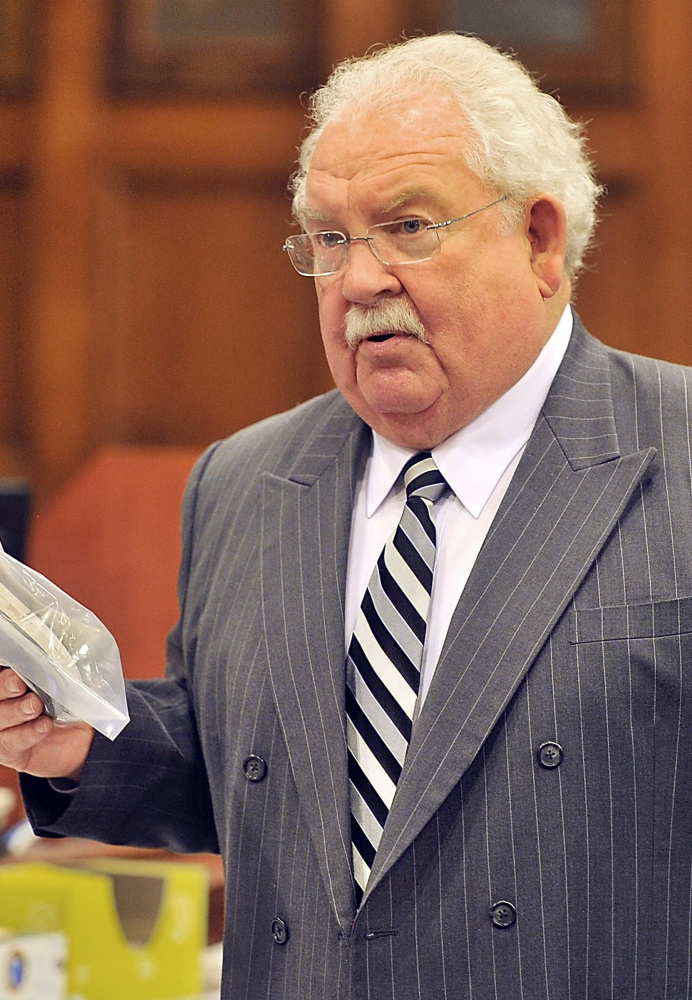Dan Lilley (who died March 11 at the age of 79) was one of the best, most expensive defense attorneys in Maine. Dressed to the nines, with haute couture suits and shoes so shiny the courtroom lights bounced off them, he worked a jury like a symphony, rising from the purr of violins to the clash of cymbals.
Tony DiMillo was a feisty kid from Munjoy Hill who quit high school to be somebody and succeeded, perhaps beyond his own wildest dreams. By the time the feds charged DiMillo with bank fraud and tax evasion, he owned the largest, most distinctive restaurant on the Portland waterfront and was a friend to cabbies and governors alike.
It helped to have money if you were hiring Dan Lilley, but he sometimes took on cases because he believed in them. The charges against 15-year-old Seiha Srey, accused of killing an 18-year-old in Portland in 1998, were withdrawn after Lilley exposed weaknesses in the case.
WATCHING THE DRAMA
But the 1985 DiMillo case was among his best-known, one that resonates still in these anti-government times. I covered courts for the Press Herald at the time and watched the drama unfold.
DiMillo may have started out on an equal footing when he got into the ring with the feds, but by the end the Internal Revenue Service and the federal banking system were down for the count, felled by an attorney who could portray even millionaires as the little guy.
Lilley had a worthy adversary in Assistant U.S. Attorney Joe Groff, who daily punched away at the intimidating authority of Judge Gene Carter, asserting his own interpretation of the federal rules of evidence. But Groff didn’t stand a chance. Lilley’s blame-the-government strategy was everything.
DiMillo had made deposits ranging from $10,000 to $100,000 in two Portland-area banks, but the banks didn’t file “currency transaction reports” as the law required. “How come they don’t have to (follow the law), and he does?” Lilley asked.
The IRS didn’t look into the deposits until five years later, and it had other failings. They may have looked like technicalities, but they were right there in the tax law, and even a law student with bad eyes could have found them.
The IRS in Maine didn’t know what its Andover, Massachusetts, Service Center was doing, the Andover Center didn’t know what was happening in the IRS in Maine, “and (a government employee) named 37, who has a number, doesn’t know what either of them was doing,” Lilley said. Yeah, OK, so maybe DiMillo should have told his accountant about the money. But although DiMillo, the banks and the IRS all made mistakes, only DiMillo was on trial. “That’s not the American way,” Lilley said.
DiMillo had told the IRS that the money wasn’t his. It was a loan from Frank Goldman to help him complete his floating restaurant.
The IRS later learned that Goldman was really Frank Venditoli, a 72-year-old with a criminal record dating to 1943 who was known by Rhode Island police to have ties to organized crime.
The jury didn’t hear the words “mob” or Mafia. It may have concluded that DiMillo’s tax problem was really Venditoli’s problem, that he was the bad guy, who’d used an alias, didn’t pay his taxes, spent time in prison, perhaps even used DiMillo for his own nefarious ends.
The jury didn’t know that Venditoli died in a Providence hospital during the trial.
WITNESS STEAMED
Lilley didn’t put DiMillo on the witness stand, and with good reason. Steamed at having been audited by the IRS so many times, livid about the slur on his reputation, DiMillo might not have been the man the jury saw in the gallery, sitting quietly with his wife and some of his nine children.
Lilley was an aggressive advocate for his client, but he didn’t come off as brash or arrogant.
His courtroom theatrics were so sophisticated, his arguments so convincing, that the jury bowed to his will. It acquitted DiMillo.
After the verdict, DiMillo told reporters he was happy to be the little guy from Munjoy Hill who had beaten the mighty U.S. of A. But he didn’t think his troubles were over.
“I want everybody to know that the IRS is going to come back at me again,” he said. “They’re going to give me a little more time to make money for the lawyers.”
Lilley, a Houlton boy and a genuinely nice guy, let DiMillo have the last word. DiMillo died in 1999 at age 66. His restaurant, popular still, is now run by his family.
If the IRS ever came after Tony DiMillo again, it didn’t make the news.
Send questions/comments to the editors.


